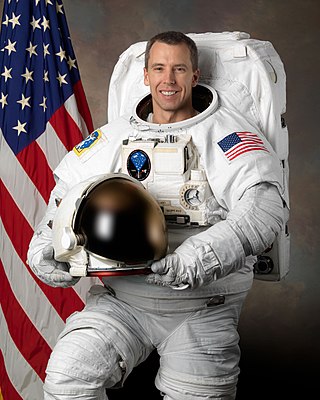A company is a legal entity representing an association of people.

The Space Shuttle is a retired, partially reusable low Earth orbital spacecraft system operated from 1981 to 2011 by the U.S. National Aeronautics and Space Administration (NASA) as part of the Space Shuttle program. Its official program name was Space Transportation System (STS), taken from a 1969 plan for a system of reusable spacecraft where it was the only item funded for development. The first (STS-1) of four orbital test flights occurred in 1981, leading to operational flights (STS-5) beginning in 1982. Five complete Space Shuttle orbiter vehicles were built and flown on a total of 135 missions from 1981 to 2011. They launched from the Kennedy Space Center (KSC) in Florida. Operational missions launched numerous satellites, interplanetary probes, and the Hubble Space Telescope (HST), conducted science experiments in orbit, participated in the Shuttle-Mir program with Russia, and participated in construction and servicing of the International Space Station (ISS). The Space Shuttle fleet's total mission time was 1,323 days.
AAA, Triple A, or Triple-A is a three-letter initialism or abbreviation which may refer to:
Misfits or The Misfits may refer to:
Caravan or caravans may refer to:
Interstellar or Interstella may refer to:

Brewster Hopkinson Shaw Jr. is a retired NASA astronaut, U.S. Air Force colonel, and former executive at Boeing. Shaw was inducted into the U.S. Astronaut Hall of Fame on May 6, 2006.
Aeolian commonly refers to things related to either of two Greek mythological figures:
The point of no return is the moment after which adverse consequences would commit one to a course of action.
An ace is a playing card.
Ollie Olsen is an Australian multi-instrumentalist, composer and sound designer. He has performed, recorded and produced rock, electronic and experimental music since the mid-1970s. His post punk groups included Whirlywirld (1978–80), Orchestra of Skin and Bone (1984–86) and No (1987–89). Olsen joined with Michael Hutchence to form a short-term band, Max Q, which issued an album in 1989. He co-founded the alternative electronic music record label Psy-Harmonics with Andrew Till in 1993. In 2014 he formed Taipan Tiger Girls.
Max Q were an Australian band formed in 1989. Playing electronic music, the band was a collaboration between Michael Hutchence of INXS and Ollie Olsen.
Cats are small domesticated mammals of the Felis catus species.

Andrew Jay "Drew" Feustel is an American/Canadian NASA astronaut and geophysicist. Following several years working as a geophysicist, Feustel was selected as an astronaut candidate by NASA in July 2000. He is the veteran of 3 space flights with NASA. His first spaceflight in May 2009, STS-125, lasted just under 13 days. This was a mission with six other astronauts to repair the Hubble Space Telescope, aboard Space Shuttle Atlantis. Feustel performed three spacewalks during the mission. His second spaceflight was STS-134, which launched on May 16, 2011, and landed on June 1, 2011. STS-134 was the penultimate Space Shuttle flight. Feustel returned to space on March 21, 2018, on Soyuz MS-08 with Expedition 55/56. For expedition 56, he commanded the International Space Station, before handing over to Alexander Gerst on October 3, 2018.
Human-rating certification, also known as man-rating or crew-rating, is the certification of a spacecraft or launch vehicle as capable of safely transporting humans. There is no one particular standard for human-rating a spacecraft or launch vehicle, and the various entities that launch or plan to launch such spacecraft specify requirements for their particular systems to be human-rated.

Branford Marsalis is an American saxophonist, composer, and bandleader. While primarily known for his work in jazz as the leader of the Branford Marsalis Quartet, he also performs frequently as a soloist with classical ensembles and has led the group Buckshot LeFonque. From 1992 to 1995 he led the Tonight Show Band.

Music in space is music played in or broadcast from a spacecraft in outer space. The first ever song that was performed in space was a Ukrainian song “Watching the sky...” sang on 12 August 1962 by Pavlo Popovych, cosmonaut from Ukraine at a special request of Serhiy Korolyov, Soviet rocket engineer and spacecraft designer from Ukraine. According to the Smithsonian Institution, the first musical instruments played in outer space were an 8-note Hohner "Little Lady" harmonica and a handful of small bells carried by American astronauts Wally Schirra and Thomas P. Stafford aboard Gemini 6A. Upon achieving a space rendezvous in Earth orbit with their sister ship Gemini 7 in December 1965, Schirra and Stafford played a rendition of "Jingle Bells" over the radio after jokingly claiming to have seen an unidentified flying object piloted by Santa Claus. The instruments had been smuggled on-board without NASA's knowledge, leading Mission Control director Elliot See to exclaim "You're too much" to Schirra after the song. The harmonica was donated to the Smithsonian by Schirra in 1967, with his note that it "...plays quite well".
This page is based on this
Wikipedia article Text is available under the
CC BY-SA 4.0 license; additional terms may apply.
Images, videos and audio are available under their respective licenses.




